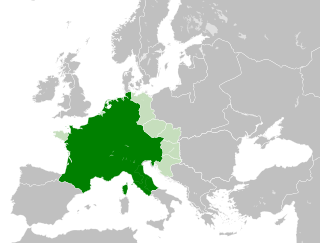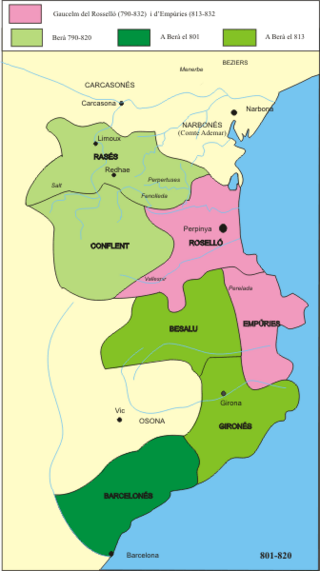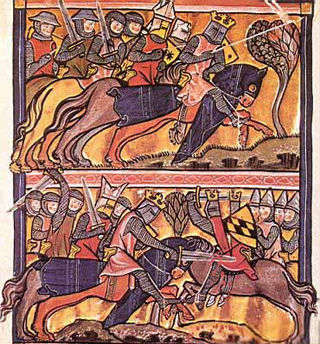
Vita Hludovici or Vita Hludovici Imperatoris (The Life of Louis or the Life of the Emperor Louis) is an anonymous biography of Louis the Pious, Holy Roman Emperor and King of the Franks from AD 814 to 840.

Vita Hludovici or Vita Hludovici Imperatoris (The Life of Louis or the Life of the Emperor Louis) is an anonymous biography of Louis the Pious, Holy Roman Emperor and King of the Franks from AD 814 to 840.
The work was written in Latin in or soon after AD 840 by an anonymous author who is conventionally called Astronomus, the Astronomer or sometimes the Limousin Astronomer. This is due to his many detailed comments on astronomical matters in the work upon which he describes himself as "one credited with having knowledge of this subject." [1] He held office at the court of Louis the Pious, and his cultural and religious references suggest that he was not a churchman. [2] It has been conjectured, based on evidence within the text, that the author was born around AD 800 and that his nationality was not Gothic or Frankish. [3]
The author's attitude to his subject is clearly subordinate and one of admiration, yet he does not idealise Louis in the same way as, for example, Einhard does in his Life of Charlemagne. It has been suggested that the author exhibits a degree of disapproval towards clerics and the workings of the Frankish Church, lending weight to the view that he was not formally connected to the Church. [4] Nevertheless, the most popular recent ideas (see below) do identify him as a cleric.

Various attempts have been made to identify the author with a particular individual. In 1729, Von Eckhart thought he was a notary attached to Louis' court between 816 and 839. Von Simson in 1909 attempted to identify him as Archdeacon Gerolt, a cleric at court. [5] Max Buchner, the author of one of the most influential modern studies of the Astronomer's work in 1940, identified him as Hilduin , the chancellor of Pippin II of Aquitaine and Charles the Bald. [6]
Ernst Tremp supports this view in his important 1995 study, although Buchner and Tremp differ by about a decade in their dating of the work. [6]
Tischler has most recently tried to make a case that the Astronomer was Jonas of Orleans but the Hilduin theory remains more popular amongst historians. [7] Recently, Courtney Booker suggested Walafrid Strabo was the Astronomer. [8]

Einhard was a Frankish scholar and courtier. Einhard was a dedicated servant of Charlemagne and his son Louis the Pious; his main work is a biography of Charlemagne, the Vita Karoli Magni, "one of the most precious literary bequests of the early Middle Ages".

Louis the Pious, also called the Fair and the Debonaire, was King of the Franks and co-emperor with his father, Charlemagne, from 813. He was also King of Aquitaine from 781. As the only surviving son of Charlemagne and Hildegard, he became the sole ruler of the Franks after his father's death in 814, a position that he held until his death except from November 833 to March 834, when he was deposed.

The Carolingian Empire (800–887) was a Frankish-dominated empire in western and central Europe during the Early Middle Ages. It was ruled by the Carolingian dynasty, which had ruled as kings of the Franks since 751 and as kings of the Lombards in Italy from 774. In 800, the Frankish king Charlemagne was crowned emperor in Rome by Pope Leo III in an effort to transfer the Roman Empire from the Byzantine Empire to Western Europe. The Carolingian Empire is sometimes considered the first phase in the history of the Holy Roman Empire.

Bera was the first count of Barcelona from 801 until his deposition in 820. He was also the count of Razès and Conflent from 790, and the count of Girona and Besalú from 812 until his deposition. In 811, he was witness to the last will and testament of Charlemagne.

The Royal Frankish Annals, also called the Annales Laurissenses maiores, are a series of annals composed in Latin in the Carolingian Francia, recording year-by-year the state of the monarchy from 741 to 829. Their authorship is unknown, though Wilhelm von Giesebrecht suggested that Arno of Salzburg was the author of an early section surviving in the copy at Lorsch Abbey. The Annals are believed to have been composed in successive sections by different authors, and then compiled.

Hilduin was Bishop of Paris, chaplain to Louis I, reforming Abbot of the Abbey of Saint-Denis, and author. He was one of the leading scholars and administrators of the Carolingian Empire.
Ermoldus Nigellus, or Niger—translated Ermold the Black, or Ermoald, was a poet who lived at the court of Pippin of Aquitaine, son of Frankish Emperor Louis I, and accompanied him on a campaign into Brittany in 824. Ermoldus was a cultured man with a knowledge of the Latin poets, and his poem, In honorem Hludovici imperatoris, has some historical value. It consists of four books and deals with the life and exploits of Louis from 781 to 826. He also wrote two poems in imitation of Ovid, which were addressed to Pippin.

Drogo, also known as Dreux or Drogon, was an illegitimate son of Frankish emperor Charlemagne by the concubine Regina.
Thegan of Trier was a Frankish Roman Catholic prelate and the author of Gesta Hludowici imperatoris which is a principal source for the life of the Holy Roman Emperor Louis the Pious, the son and successor of Charlemagne.
Guerin, Garin, Warin, or Werner was the Count of Auvergne, Chalon, Mâcon, Autun, Arles and Duke of Provence, Burgundy, and Toulouse. Guerin established the region against the Saracens from a base of Marseille and fortified Chalon-sur-Saône (834). He took part in many campaigns during the civil wars that marked the reign of Louis the Pious (814–840) and after his death until the Treaty of Verdun (843). The primary sources for his life are charters and chronicles like the Vita Hludovici.
Cadolah was the Duke of Friuli from 817 to his death. He was a son of Count Berthold (Pera[h]told) and an Ahalolfinger.
Pepin, or Pippin the Hunchback was a Frankish prince. He was the eldest son of Charlemagne and noblewoman Himiltrude. He developed a humped back after birth, leading early medieval historians to give him the epithet "hunchback". He lived with his father's court after Charlemagne dismissed his mother and took another wife, Hildegard. Around 781, Pepin's half brother Carloman was rechristened as "Pepin of Italy"—a step that may have signaled Charlemagne's decision to disinherit the elder Pepin, for a variety of possible reasons. In 792, Pepin the Hunchback revolted against his father with a group of leading Frankish nobles, but the plot was discovered and put down before the conspiracy could put it into action. Charlemagne commuted Pepin's death sentence, having him tonsured and exiled to the monastery of Prüm instead. Since his death in 811, Pepin has been the subject of numerous works of historical fiction.
Wala was a son of Bernard, son of Charles Martel, and one of the principal advisers of his cousin Charlemagne, of Charlemagne's son Louis the Pious, and of Louis's son Lothair I. He succeeded his brother Adalard as abbot of Corbie and its new daughter foundation, Corvey, in 826 or 827. His feast day is 31 August

Vita Karoli Magni is a biography of Charlemagne, King of the Franks and Emperor of the Romans, written by Einhard. The Life of Charlemagne is a 33 chapter account starting with the full genealogy of the Merovingian family, going through the rise of the Carolingian dynasty, and then detailing the exploits and temperament of King Charles. It has long been seen as one of the key sources for the reign of Charlemagne and provides insight into the court of King Charles and the events that surrounded him.

There was an Abbasid–Carolingian alliance during the 8th and 9th centuries, effected through a series of embassies, rapprochements and combined military operations between the Frankish Carolingian Empire and the Abbasid Caliphate.

The Karolus magnus et Leo papa, sometimes called the Paderborn Epic or the Aachen Epic, is a Carolingian Latin epic poem of which only the third of four books is extant. It recounts the meeting of Charlemagne, king of the Franks, with Pope Leo III, in AD 799.

Grimald, Latinised Grimaldus, was abbot of Weissenburg Abbey, abbot of the Abbey of Saint Gall (841–872), arch-chaplain of the East Frankish king Louis the German (848–870) and chancellor. He was one of the founders of scholarly education in the East Franconian Empire and in St. Gall.
The siege of Tortosa was a military campaign by King Louis the Pious of Aquitaine in 808–809. It was part of a decade of intense activity by Louis against the Umayyad Emirate of Córdoba in the region of the lower Ebro. The chronology of his campaigns, which must be worked out from both Latin and Arabic sources, is subject to different interpretations.
The siege of Barcelona was a military operation by a Carolingian army with the aim of conquering the city of Barcelona, which had been under Muslim control for 80 years. The siege and conquest were part of the expansion of the Marca Hispanica and the constitution of the County of Barcelona by the Carolingians.

The Gesta Dagoberti, fully Gesta domni Dagoberti regis Francorum, is an anonymous Latin biography of Dagobert I, king of the Franks (623–639). It combines deeds from the life of Dagobert with numerous accounts of miracles to present Dagobert as a saint and the founder of the Abbey of Saint-Denis. It was written in the early 9th century. As a historical source, it is "extremely unreliable", but not totally useless.